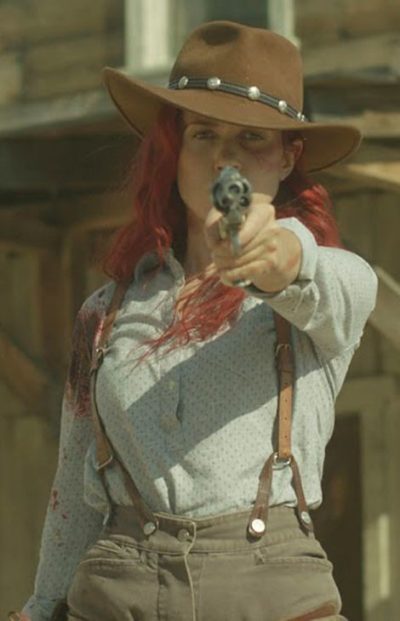★★½
“Better red than dead. Albeit, only just.”
 Josephine “Joe” Cassidy (Eiland) is promised in marriage to Tom (Jenkins), the son of the area’s richest rancher, but her heart actually belongs to Jakob (Grasl), the Indian who is Tom’s adopted brother. The two lovers consummate their relationship when Tom is away, but the spurned fiancee hatches a long-term plan to get revenge. Years later, after becoming the local sheriff, he uses these connections to frame and execute Jakob for murder. Word of this reaches Joe, who conveniently for the plot is handy with a firearm, because her father (Cramer) was a renowned bounty-hunter, and passed on the necessary skills to her. Dying her hair red – hence the title – she sets out to take revenge on Tom, only for him to reveal that Jakob is not dead… Not yet, anyway.
Josephine “Joe” Cassidy (Eiland) is promised in marriage to Tom (Jenkins), the son of the area’s richest rancher, but her heart actually belongs to Jakob (Grasl), the Indian who is Tom’s adopted brother. The two lovers consummate their relationship when Tom is away, but the spurned fiancee hatches a long-term plan to get revenge. Years later, after becoming the local sheriff, he uses these connections to frame and execute Jakob for murder. Word of this reaches Joe, who conveniently for the plot is handy with a firearm, because her father (Cramer) was a renowned bounty-hunter, and passed on the necessary skills to her. Dying her hair red – hence the title – she sets out to take revenge on Tom, only for him to reveal that Jakob is not dead… Not yet, anyway.
The structure here is quite convoluted – rather needlessly, I’d say. Not only does it unfold in several different eras, the entire thing is enclosed in wraparound sections, where the story of Cassidy Red is being told, for inspirational purposes, by a piano-player in a brothel to one of the working girls. It’s definitely a case where less feels like it would have been more, with a straightforward chronological timeline working to the film’s benefit, instead of characters dropping in and out. Perhaps the director felt that might have been too simple, for once you peel away the trapping, this is indeed a very straightforward tale of revenge. Is that necessarily a bad thing, though?
This was submitted for Knudsen’s thesis at UCLA’s School of Theater, Film, and Television, which perhaps explains some of the issues here: on occasion, it certainly does feels as if it was an academic requirement with an earnest Message (capital M used deliberately), rather than wanting to tell its story. The best section is likely the one where Joe is being taught the mechanics of gun-fighting by her father, which is very well written, performed and edited. The result is a sequence that sheds genuine light into the mindset of someone who, for survival, has to be permanently ready to shoot to kill. Given the limited budget here, credit is due for production values which are generally good. It was filmed largely on location at Old Tucson Studios, and that adds authenticity to the 19th-century Arizona setting, which some films wouldn’t have bothered with.
Other parts, unfortunately, fall short of that, and some are flat-out unconvincing – the scene where Jakob is taken on board as a foster son, for example, seems entirely inexplicable, and they just shouldn’t have bothered, since it’s not something the audience needs to see. It’s a shame, since the central performance is good: however, the two male leads both struggle to be more than forgettable, and that leaves the end result feeling unbalanced on the dramatic level. This sporadic quality is perhaps the biggest problem: there seems a general unevenness of tone and approach, resulting in a film which takes two steps forward, then one back.
Dir: Matt Knudsen
Star: Abigail Eiland, David Thomas Jenkins, Jason Grasl, Rick Cramer




